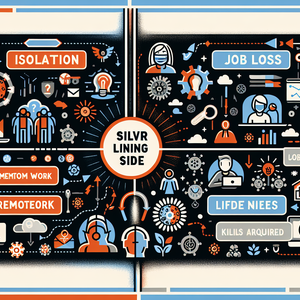The Rise of Remote Work: How Women Are Shaping the Future of Employment

One of the most significant advantages of remote work is its inherent flexibility. For many women, especially those with caregiving responsibilities, this flexibility can mean the difference between pursuing a career and stepping back entirely. A survey conducted by FlexJobs revealed that 73% of women cited work-life balance as a top reason for seeking remote work opportunities. For instance, Sarah, a former marketing manager, transitioned to a remote role after the birth of her second child. She now works as a freelance digital marketer, allowing her to manage her schedule around her family's needs. This balance has not only enhanced her quality of life but has also positively impacted her productivity and job satisfaction. This example is reflective of a broader trend where women in similar situations find that remote work enables them to fulfill both professional and personal commitments without compromising their well-being.
Diverse Job Opportunities
The rise of remote work has opened doors to a myriad of job opportunities that were previously inaccessible to many women, particularly those living in rural areas or regions with limited job markets. Careers in tech, customer service, education, and creative fields are increasingly available on a remote basis. According to the Bureau of Labor Statistics, remote job postings have surged, with a significant portion of them targeting women. For example, in the tech industry, women are breaking barriers in software development and project management roles. Companies like GitHub and Automattic have implemented remote-first policies, which not only attract female talent but also foster diverse teams that enhance creativity and innovation. The increased accessibility of remote jobs has empowered women to pursue careers in industries where they were historically underrepresented, thus enriching the workforce with diverse perspectives.
Networking and Community Building
Remote work has also facilitated new forms of networking and community building among women. Online platforms and social media groups have become invaluable resources for women seeking mentorship, collaboration, and support in their careers. Virtual events and webinars allow women to connect with industry leaders and peers across the globe, breaking down geographical barriers. One notable example is the Women Who Code organization, which offers virtual meetups, coding workshops, and networking events. This initiative empowers women in tech to share their experiences and foster a supportive community, ultimately leading to greater representation in the industry. Such platforms not only enhance professional growth but also create a sense of belonging and shared purpose among women, reinforcing their role in shaping the future of work.
Challenges and Solutions
While the shift to remote work presents numerous advantages, it also comes with challenges. Women may face feelings of isolation and difficulty in separating work from home life, leading to burnout. According to a survey by McKinsey, women in remote roles reported higher levels of stress and anxiety compared to their male counterparts, primarily due to the dual responsibilities of work and home. To mitigate these challenges, organizations are encouraged to implement policies that promote employee well-being, such as regular check-ins, clear communication channels, and professional development opportunities. Moreover, women can take proactive steps by establishing boundaries and creating dedicated workspaces to maintain a healthy work-life balance. By fostering an environment that prioritizes mental health and encourages open dialogue, organizations can help their female employees thrive in remote settings.
The rise of remote work is not just a trend; it is a transformative shift that is reshaping the future of employment. Women are at the forefront of this change, leveraging the flexibility and opportunities presented by remote work to achieve their professional goals while managing their personal lives. As organizations adapt to this new landscape, embracing diversity and supporting their remote workforce will be crucial in fostering innovation and productivity. By prioritizing work-life balance, creating inclusive environments, and encouraging community building, we can ensure that women continue to shape the future of work for generations to come. In conclusion, as remote work solidifies its place in the employment landscape, it is imperative to recognize and support the significant role women play in this evolution. By addressing the unique challenges they face and harnessing the opportunities presented by remote work, we can create a more equitable and dynamic workforce that benefits everyone.
Remote Digital Marketing Specialist
HubSpot, Buffer, various e-commerce businesses
Core Responsibilities
Develop and implement digital marketing campaigns across various platforms (social media, email, SEO).
Analyze campaign performance metrics to refine strategies and increase engagement.
Collaborate with cross-functional teams to align marketing initiatives with broader business goals.
Required Skills
Proficiency in tools like Google Analytics, SEMrush, and social media management platforms.
Strong writing and communication skills to create compelling content.
Ability to adapt marketing strategies based on performance data and market trends.
Remote Project Manager in Tech
GitHub, Automattic, various tech startups
Core Responsibilities
Oversee software development projects from initiation through to completion, ensuring timely delivery and adherence to budgets.
Facilitate communication between technical teams and stakeholders to clarify project requirements and updates.
Utilize Agile methodologies to enhance team productivity and project efficiency.
Required Skills
Experience with project management tools like Jira, Trello, or Asana.
Strong leadership and organizational skills to manage diverse teams.
Technical understanding of software development processes and terminology.
Remote Customer Success Manager
Zendesk, Freshdesk, SaaS companies
Core Responsibilities
Serve as the main point of contact for clients, ensuring they derive maximum value from products or services.
Conduct regular check-ins and onboarding sessions to enhance customer experience and satisfaction.
Analyze customer feedback and usage data to identify and address potential issues proactively.
Required Skills
Excellent interpersonal and communication skills to build strong client relationships.
Familiarity with CRM software (e.g., Salesforce, HubSpot) and data analysis tools.
Problem-solving skills to handle customer queries and improve service delivery.
Remote Online Educator or Course Developer
Coursera, Udemy, educational institutions
Core Responsibilities
Design and deliver engaging online courses or workshops in a specific subject area.
Assess student progress and provide personalized feedback to facilitate learning.
Utilize various digital tools and platforms to enhance the online learning experience.
Required Skills
Expertise in the subject matter and experience in online teaching methodologies.
Familiarity with Learning Management Systems (LMS) like Moodle or Canvas.
Strong organizational skills and creativity in course design to engage learners.
Remote UX/UI Designer
Shopify, InVision, various tech firms
Core Responsibilities
Conduct user research to understand user needs and behaviors, translating findings into design solutions.
Create wireframes, prototypes, and high-fidelity designs for web and mobile applications.
Collaborate with developers to ensure design feasibility and implementation of user-friendly interfaces.
Required Skills
Proficiency in design tools such as Adobe XD, Sketch, or Figma.
Strong understanding of user-centered design principles and usability testing.
Ability to communicate design concepts effectively to both technical and non-technical stakeholders.


